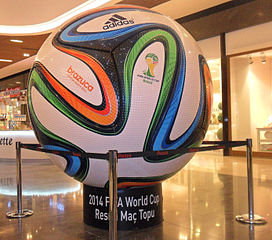World Cup Preview: 2014

Brazil hosts soccer's biggest event for the second time
The 2014 FIFA World Cup, the 20th annual premier international sporting event, will run June 12-July 13, in Brazil. This will be the second time that Brazil has hosted the World Cup. The country previously hosted the event in 1950.
National teams from 32 countries will compete in 64 matches in 12 cities. The teams have been separated into eight groups of four teams each and the teams play a round-robin format, meaning that each team in a group plays the other teams in their group once. Then the top two teams advance to the second round, and the tournament uses a single-elimination format until its conclusion.
Construction Delays
Brazil has reportedly spent an estimated $11.5 billion so far on new stadiums, transportaion, and airports to prepare for the 2014 World Cup. New venues were built in five of the 12 host cities while six venues received extensive renovations and one in Brasilia was completely torn down and rebuilt.
In Jan. 2013, construction on the first brand new stadium, the Castelão, located in Fortaleza was completed. Six of the venues were ready and used for the 2013 Confederation Cup. However, the completion of one of the new stadiums, Arena Corinthians was delayed by the collapse of a crane. The incident, which happened in Nov. 2013, killed two construction workers and damaged the stadium. Moreover, six other stadiums missed FIFA's Dec. 31, 2013, completion deadline.
After visiting the Arena da Baixada in Curitiba in Jan. 2014, FIFA general secretary Jerome Valcke said the city might have to be dropped as a host city unless significant progress was made on the arena's renovation by mid-February. On Feb. 18, FIFA announced that Curitiba would remain a host city despite the construction delays.
The Debut of Goal-Line Technology
For the first time at the World Cup, goal-line technology will be used. Goal-line technology is an electronic device that assists the referees in determining if and when the ball crosses the goal line and whether to award a goal or not.
The new technology is used to assist referees, not replace them. FIFA began using it for the first time in 2012. The U.S. has used it in Major League Soccer since 2013.
Donovan Left Off the U.S. Team
In May 2014, U.S. team coach Jürgen Klinsmann made headlines when he cut the most accomplished American player in the history of men's soccer, Landon Donovan, from the team's final roster. Klinsmann made the decision and announcement days before the June 2 deadline. Klinsmann's son, Jonathan, who is also a goalkeeper with the U.S. under-18 team, added to the controversy when he posted a tweet making fun of Donovan being cut from the World Cup team. The tweet and the account were deleted.
In a statement posted on his Facebook page, Donovan said, "I was looking forward to playing in Brazil and, as you can imagine, I am very disappointed with today's decision. Regardless, I will be cheering on my friends and teammates this summer, and I remain committed to helping grow soccer in the U.S. in the years to come." Only six players from the 2010 team are returning: goalkeepers Tim Howard and Brad Guzan, forwards Jozy Altidore and Clint Dempsey, midfielder Michael Bradley, and defender DaMarcus Beasley.
Other Contenders
Croatia, Mexico, and Cameroon have the misfortune of being part of Group A with Brazil. The host country team, Brazil is also a heavy favorite to win. Brazil's opening match is against Croatia, a rematch of the 2006 match in Germany, which Brazil won. Mexico has been struggling in recent years, losing four finals, the last one at the 2012 Olympics in London. However, despite Mexico's struggles, the team is predicted to move on to the second round with Brazil.

Eyes are also on Belgium in Group H for two reasons. One reason is the country has a talented team led by 23-year-old Eden Hazard, one of the world's best young players. The other reason is that Group H has no other major contenders, setting the stage for Belgium to move on to the second round with ease. Also in Group H is Russia, which is ranked 18 by FIFA, Algeria, which is ranked 25, and South Korea, ranked at 55. Ranked 12 overall, Belgium's Red Devils are the dark horse team to watch in the 2014 World Cup.
Despite construction delays and the race to get the stadiums completed in time, as the 2014 World Cup approaches, excitement grows. With the host team a heavy favorite to win, Brazil prepares for an international competition that could end in celebration of their team as champion.
and Catherine McNiff








